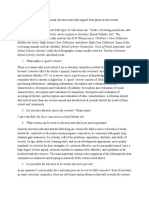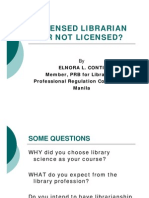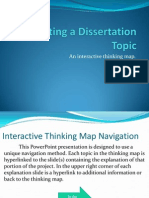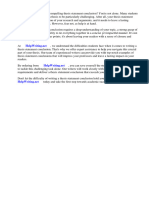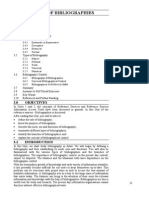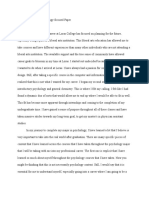Collection Development Librarian Interview
Collection Development Librarian Interview
Uploaded by
katemillerjdmlsCopyright:
Available Formats
Collection Development Librarian Interview
Collection Development Librarian Interview
Uploaded by
katemillerjdmlsOriginal Description:
Copyright
Available Formats
Share this document
Did you find this document useful?
Is this content inappropriate?
Copyright:
Available Formats
Collection Development Librarian Interview
Collection Development Librarian Interview
Uploaded by
katemillerjdmlsCopyright:
Available Formats
Collection Development Librarian Interview
Kate Miller
LI855 Collection Development and Management Summer 2013
For this assignment, I interview Lawrence MacLachlan, the Director of Research and Instructional Services at University of Missouri Kansas City. I have worked with Larry for a little over a year now. I learned details about collection development at the law library from speaking to him. Larry received his J.D. from Wayne State University, and his M.L.S from Catholic University of America in Washington D.C. He did take a general collection development class during library school. He felt it was quite generic, but he appreciated the exposure to asking the right types of questions during the collection development process. He felt the class was very practical because it covered situations of determining collections where the budget was limited. During our interview, Larry explained the collection development process for the library. He uses a program called GOBI to select materials and send his selection to the acquisitions librarian. Larry filled out profile based on the libraries current collection development. According to the librarys profile, certain books are emailed to Larry that fit the profile criteria and Larry peruses the options and determines if they are worth ordering. Larry stated that the profile does change based on the composition of the student body as well as particular faculty research areas. He stated that technology has changed the process dramatically since when he started at UMKC. He explained that he used to have to read through stacks of catalogs filled with book listings to select the materials for the law library. Now with the availability of World Cat, publisher websites, and electronic profiles, it has increased the speed of determining which books are unique and useful to the faculty, staff and students who use the library. He can also quickly check the price of the materials as well as the availability of the materials via other channels like interlibrary loan. Larry explained that the availability of website ordering was the thing he liked most about his recent job evolution.
After he makes his selections, the library material requested is emailed to Glenn Higley, the Acquisitions Associate, who orders the books. Glenn also keeps the budget updated, and lets Larry know if more money becomes available to spend on more library materials. At times, the Library Director and Associate Director make suggestions for titles to acquire. Faculty may request material depending on their teaching topics, and students may request material based on their research. Larry explained that we do not have an external clearinghouse, but that he was the in-house clearinghouse. Ultimately, Larry makes the decision as to which books to order, and Glenn executes those requests. He said that he never has had a book challenged, but has had complaints about certain books. Even with multiple complaints, he said that he has never removed a book due to anyones objections. Larry also mentioned that there have been times when he has refuse to purchase books that were suggested to him to order for the library. He said that the book needs to be useful and within the realm of the broader scope of the law to be included in the collection. He referred me to the UMKC Law Library website which is linked to the schools collection development policy. Although he doesnt refer to the 114 page policy as much now that he is familiar with it, Larry said that if there was any debate, that he would use the collection policy to determine the outcome. On the topic of eBooks, Larry mentioned that he has found that the faculties arent aware of the digital resources available in the law library. He thinks that primary law resources, including cases, statutes and regulations, will become primarily online. However, he believes that secondary material will be kept in print for the most part. He feels that secondary sources primarily will be where the library can add value to faculty and students. Larry also stated that the law library world seems to be moving away from materials that need loose-leaf supplementation. Larry noted that the law library has shifted to less emphasis on the public and more on teaching and research.
I learned a great amount from interviewing Larry about collection development but also about the direction of law librarianship in general. I found him to be quite helpful in explaining the process to someone who is new to collection development. I look forward to the way that libraries will continue to evolve in the coming years.
You might also like
- Librarian Interview Questions FinalDocument3 pagesLibrarian Interview Questions Finalbwengu100% (1)
- Lis 524 Discussion 3Document2 pagesLis 524 Discussion 3api-236468899100% (1)
- Methods 169 Syllabus Fall 2014Document8 pagesMethods 169 Syllabus Fall 2014buddhaNo ratings yet
- Everything You Always Wanted to Know About Information Literacy But Were Afraid to GoogleFrom EverandEverything You Always Wanted to Know About Information Literacy But Were Afraid to GoogleNo ratings yet
- The Elements of Library Research: What Every Student Needs to KnowFrom EverandThe Elements of Library Research: What Every Student Needs to KnowRating: 5 out of 5 stars5/5 (1)
- Interview Syllabus For LibrarianDocument9 pagesInterview Syllabus For LibrarianPankaj kumar shuklaNo ratings yet
- Outreach Trends in Academic LibrariesDocument12 pagesOutreach Trends in Academic Librariesapi-419831607No ratings yet
- Strategic Management in LibrariesDocument9 pagesStrategic Management in LibrariesSameem KardarNo ratings yet
- 40 Most Asked Librarian Interview Questions With AnswersDocument10 pages40 Most Asked Librarian Interview Questions With AnswersMuhammad Ali100% (1)
- LlICENSED (Compatibility Mode)Document17 pagesLlICENSED (Compatibility Mode)mshslibraryNo ratings yet
- Indexingand Abstracting ServicesDocument27 pagesIndexingand Abstracting ServicesMohammad NasirNo ratings yet
- Librarian Interview Questions and Answers Guide.: Global GuidelineDocument6 pagesLibrarian Interview Questions and Answers Guide.: Global Guidelinejoseph emmanuelNo ratings yet
- (Martin A. Kesselman, Irwin Weintraub) Global Libr PDFDocument343 pages(Martin A. Kesselman, Irwin Weintraub) Global Libr PDFMarie CamilleriNo ratings yet
- ETEC 579 Discussion 5Document2 pagesETEC 579 Discussion 5Kristin McCloskeyNo ratings yet
- Selecting A Dissertation TopicDocument40 pagesSelecting A Dissertation Topiccoachanderson08100% (1)
- Health Librarianship An IntroductionDocument312 pagesHealth Librarianship An Introductionlaggantiggan100% (1)
- Introduction To Systematic Reviews PowerpointDocument30 pagesIntroduction To Systematic Reviews Powerpointizeldien5870No ratings yet
- Eport Reflection HeilmanDocument8 pagesEport Reflection Heilmanapi-653075991No ratings yet
- Myers Qualitative ResearchDocument19 pagesMyers Qualitative ResearchMuhammad Asroruddin100% (2)
- Preservation and Conservation of Library Materials in University Libraries in South West NigeriaDocument12 pagesPreservation and Conservation of Library Materials in University Libraries in South West NigeriaYusuf TayeNo ratings yet
- Librarian CourseworkDocument5 pagesLibrarian Courseworkiyldyzadf100% (2)
- Kinds of Variables and Their UsesDocument31 pagesKinds of Variables and Their UsesCristian DepalomaNo ratings yet
- Grounded Theory Methodology Applied in Education ResearchDocument20 pagesGrounded Theory Methodology Applied in Education ResearchalejandraNo ratings yet
- Public Libraries - A Misunderstood Civic InstituitionDocument7 pagesPublic Libraries - A Misunderstood Civic InstituitionMichael L. Porter100% (1)
- Funding For PHD Thesis WritingDocument4 pagesFunding For PHD Thesis Writingcarolinacardonapaterson100% (1)
- LIS ObjectiveDocument55 pagesLIS ObjectivePRASANTH KUMAR100% (2)
- How Do You Write A Thesis Statement For A Cause and Effect EssayDocument7 pagesHow Do You Write A Thesis Statement For A Cause and Effect Essaydthtrtlfg100% (1)
- 68-Phases in Research ProcessDocument6 pages68-Phases in Research ProcessShubham Amar SheteNo ratings yet
- How To Write A Proposal For Research PaperDocument6 pagesHow To Write A Proposal For Research PaperManahil SardarNo ratings yet
- Library Science Dissertation TopicsDocument5 pagesLibrary Science Dissertation TopicsCanYouWriteMyPaperSingapore100% (1)
- Trends in Library Classification PDFDocument14 pagesTrends in Library Classification PDFPriyank SinghNo ratings yet
- Mixed-Methods Research: A Discussion On Its Types, Challenges, and CriticismsDocument12 pagesMixed-Methods Research: A Discussion On Its Types, Challenges, and CriticismsJester ManioNo ratings yet
- Collection: Ollection Centered EchniquesDocument8 pagesCollection: Ollection Centered EchniquesHellenNdegwaNo ratings yet
- Hampton Literature ReviewDocument11 pagesHampton Literature ReviewSK DarsyanaaNo ratings yet
- Field NotesDocument3 pagesField NotescartershannonNo ratings yet
- Mock Job InterviewDocument14 pagesMock Job InterviewRj AmatorioNo ratings yet
- Library ScienceDocument63 pagesLibrary ScienceShaheryar SadiqNo ratings yet
- Library Science Articles PDFDocument226 pagesLibrary Science Articles PDFJatinder KumarNo ratings yet
- Diversity and Inclusion ReflectionDocument5 pagesDiversity and Inclusion Reflectionapi-542893729No ratings yet
- Action Research PreseantationDocument29 pagesAction Research PreseantationKusrini Kadar SyamsalamNo ratings yet
- Qualitative Data Collection - Presentation MaterialDocument15 pagesQualitative Data Collection - Presentation MaterialJudielyn SuaseNo ratings yet
- Methods of ResearchDocument15 pagesMethods of Researchmichael angelo Burac100% (1)
- BLIS. Library Information ScienceDocument13 pagesBLIS. Library Information ScienceRam kumarNo ratings yet
- PHD Thesis First ChapterDocument5 pagesPHD Thesis First Chaptercynthiawilsonarlington100% (2)
- Thesis Statement Conclusion ExamplesDocument6 pagesThesis Statement Conclusion Examplessew0m0muzyz3100% (1)
- Technical English: in Food TechnologyDocument26 pagesTechnical English: in Food TechnologyTiến MinhNo ratings yet
- Technical and Information ServicesDocument26 pagesTechnical and Information ServicesdybsydollzNo ratings yet
- 1 Evaluation and Analysis of Cranbrook Library's Collection Development PolicyDocument9 pages1 Evaluation and Analysis of Cranbrook Library's Collection Development PolicyKelly BrooksNo ratings yet
- ENGACPROF 5. Research SkillsDocument29 pagesENGACPROF 5. Research SkillsDenise Corpin100% (1)
- BRM PPT, 2021Document22 pagesBRM PPT, 2021best OneNo ratings yet
- Literature Review On Record Management SystemDocument4 pagesLiterature Review On Record Management Systemc5rw1ymp100% (1)
- Winnipeg Public Library - Strategic PlanDocument8 pagesWinnipeg Public Library - Strategic PlanChrisDcaNo ratings yet
- Retrieval ToolsDocument3 pagesRetrieval ToolsNithyaa SathishNo ratings yet
- Trends in LibrariesDocument12 pagesTrends in LibrariesWADYNo ratings yet
- Organization of Library MaterialsDocument28 pagesOrganization of Library MaterialsSoon Yang Yang100% (1)
- Thesis Information Technology TopicsDocument7 pagesThesis Information Technology Topicscrystaljacksonnewhaven100% (1)
- Power and Positionality - Negotiating Insider:Outsider Status Within and Across CulturesDocument14 pagesPower and Positionality - Negotiating Insider:Outsider Status Within and Across CultureshedgerowNo ratings yet
- PHENOMENOLOGYDocument54 pagesPHENOMENOLOGYsrimalathiNo ratings yet
- Reference and Information Sources UnitDocument15 pagesReference and Information Sources UnitnagasmsNo ratings yet
- Flocabulary Lesson PlanDocument7 pagesFlocabulary Lesson Planapi-271682763No ratings yet
- 2019 Yeoman Carvalho Moving Between Mayerial ACDADocument26 pages2019 Yeoman Carvalho Moving Between Mayerial ACDApacoperez2008No ratings yet
- Gad Legal Mandate1Document87 pagesGad Legal Mandate1crixzam100% (1)
- Psy 490 Portfolio PsychologyDocument5 pagesPsy 490 Portfolio Psychologyapi-584364442No ratings yet
- 2020-2021 Combined Degree GuideDocument18 pages2020-2021 Combined Degree GuideRiri DianaNo ratings yet
- Ielts General Reading Test 3Document8 pagesIelts General Reading Test 3SayemNo ratings yet
- Application For Undergraduate Admission: (International and Local)Document8 pagesApplication For Undergraduate Admission: (International and Local)Peter SimonNo ratings yet
- Creativity and Narrative Task PerformancesDocument28 pagesCreativity and Narrative Task PerformancesHaerul MajidNo ratings yet
- ACTIVITY 5.1 Teaching ApproachesDocument2 pagesACTIVITY 5.1 Teaching Approachesvidya pmNo ratings yet
- ResumeDocument2 pagesResumeapi-548885130No ratings yet
- Quigley Caroline ResumeDocument2 pagesQuigley Caroline Resumeapi-354113656No ratings yet
- (CC102) Comprog1Document4 pages(CC102) Comprog1Homer ErminoNo ratings yet
- Unit 4 BENLAC A BDocument28 pagesUnit 4 BENLAC A BLeah Angelica BerdulagaNo ratings yet
- Life and Work Reading Practice Level A PrintDocument12 pagesLife and Work Reading Practice Level A PrintAndrea MoralesNo ratings yet
- Presentation Univers Plus - EnglishDocument2 pagesPresentation Univers Plus - EnglishcristiungurianuNo ratings yet
- Ib Workshops Catalogue Fy2324 enDocument100 pagesIb Workshops Catalogue Fy2324 enNadia Fradi Ben EsghairNo ratings yet
- Walking and Jogging Formative AssessmentsDocument2 pagesWalking and Jogging Formative Assessmentsapi-321262957No ratings yet
- Ishikawa Fishbone Diagram PDFDocument1 pageIshikawa Fishbone Diagram PDFsamu hayesNo ratings yet
- All Subjects w7 d1Document5 pagesAll Subjects w7 d1ritscontrerasNo ratings yet
- 9th Grade Bridge Law 20-21Document33 pages9th Grade Bridge Law 20-21api-296918325No ratings yet
- Teacher's Accomplishment Report 6Document3 pagesTeacher's Accomplishment Report 6Edessa MasinasNo ratings yet
- Parental Support QuestionaireDocument2 pagesParental Support QuestionaireAllyn Mae Taglocop VillantesNo ratings yet
- Intervention Plan in Science V: Don B. Del Mundo Memorial SchoolDocument1 pageIntervention Plan in Science V: Don B. Del Mundo Memorial SchoolDyaan TrajicoNo ratings yet
- Writing Task I - AnthrologyDocument2 pagesWriting Task I - AnthrologyShiela RojoNo ratings yet
- Finance For Kiu Students - 1633103758Document2 pagesFinance For Kiu Students - 1633103758henry100% (1)
- Instructional Planning ModelsDocument15 pagesInstructional Planning ModelsNorjianah WaliNo ratings yet
- Theory and Practice of The Quintile Ranking of Schools in South Africa: A Financial Management PerspectiveDocument9 pagesTheory and Practice of The Quintile Ranking of Schools in South Africa: A Financial Management Perspectiveihda0farhatun0nisakNo ratings yet
- Chapter 4: Post Test: Complete The Statements by Writing The Answer in The BlanksDocument4 pagesChapter 4: Post Test: Complete The Statements by Writing The Answer in The Blanksjohncyrus dela cruzNo ratings yet
- Le Mtb-Mle Pang-CoDocument7 pagesLe Mtb-Mle Pang-CoLouisse Gayle AntuerpiaNo ratings yet
- Nurhayati Hattapayo (SKRIPSII1) - 1-1-1Document66 pagesNurhayati Hattapayo (SKRIPSII1) - 1-1-1YattyhtpyoNo ratings yet

